Unit 5 单元综合复习课件 (人教英语七下Unit 5 Why do you like pandas?)
文档属性
| 名称 | Unit 5 单元综合复习课件 (人教英语七下Unit 5 Why do you like pandas?) |

|
|
| 格式 | pptx | ||
| 文件大小 | 39.7MB | ||
| 资源类型 | 试卷 | ||
| 版本资源 | 人教新目标(Go for it)版 | ||
| 科目 | 英语 | ||
| 更新时间 | 2024-06-01 00:00:00 | ||
图片预览



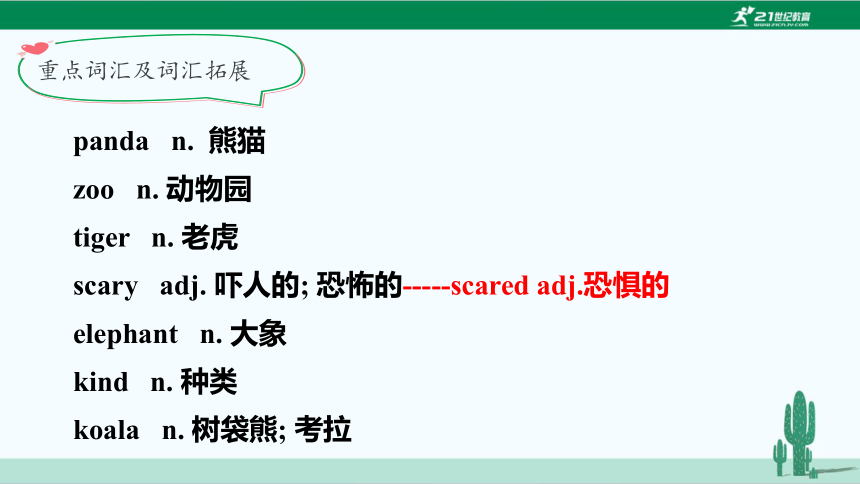
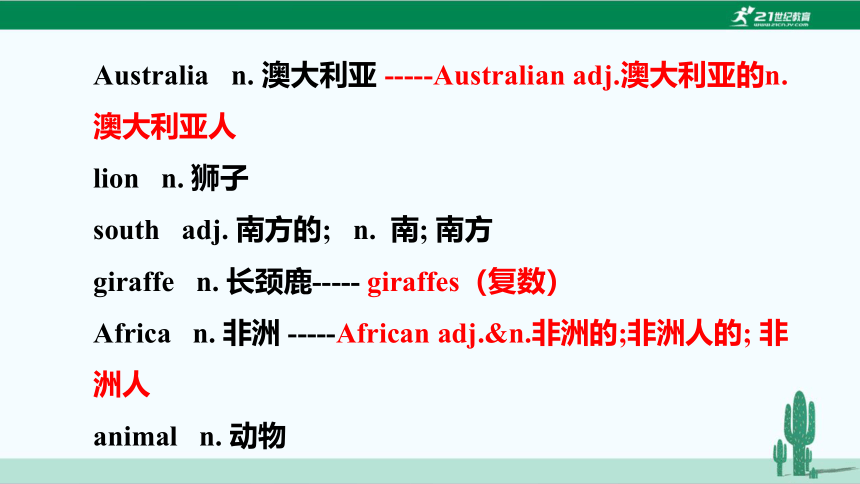
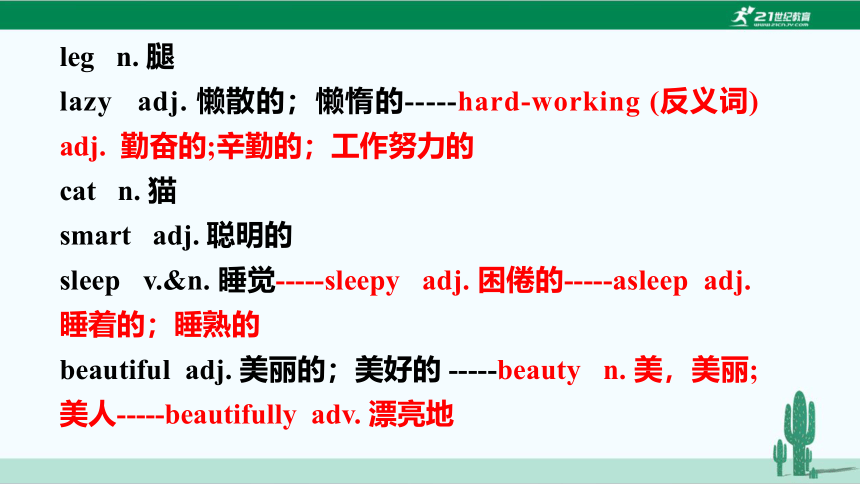
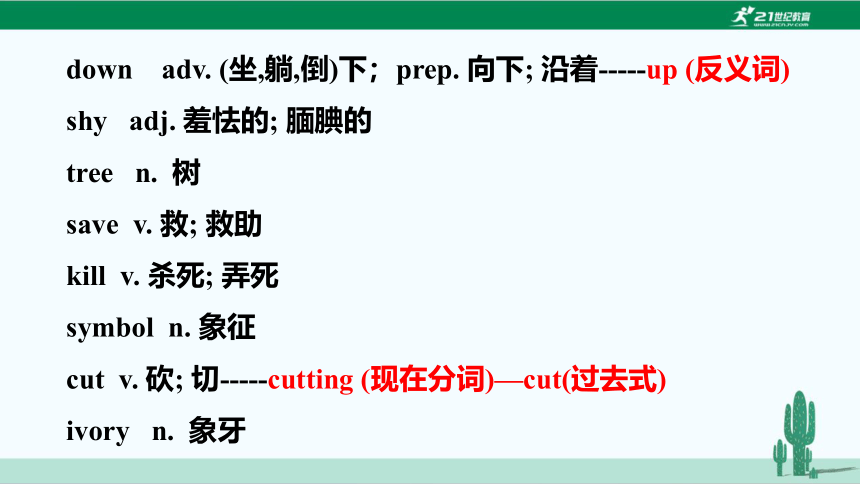
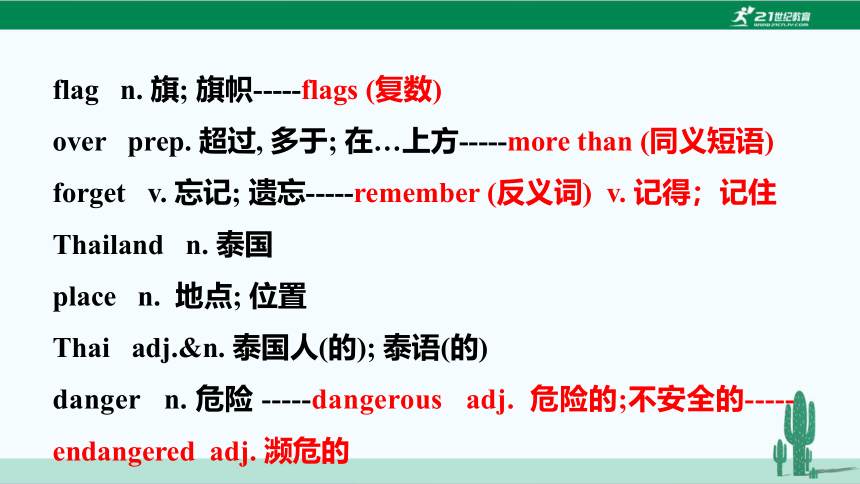
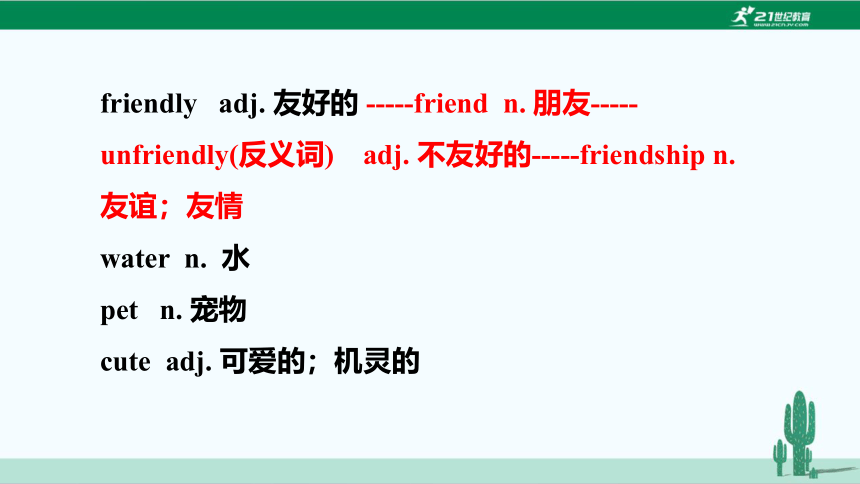
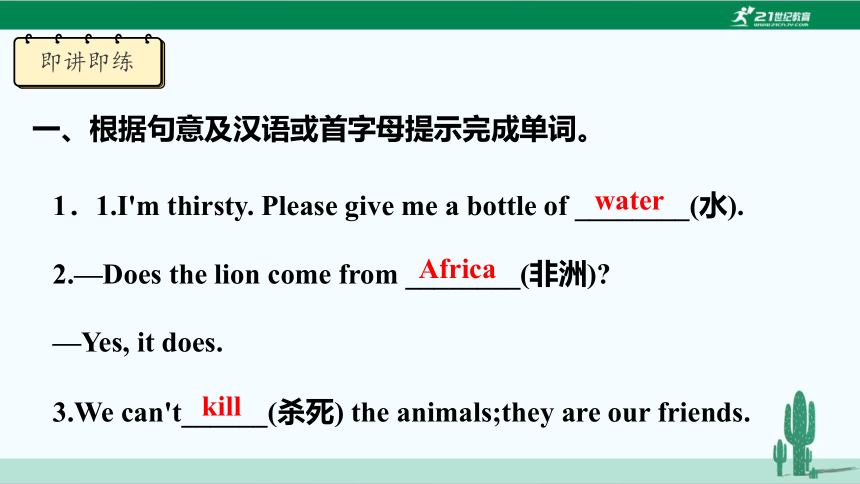

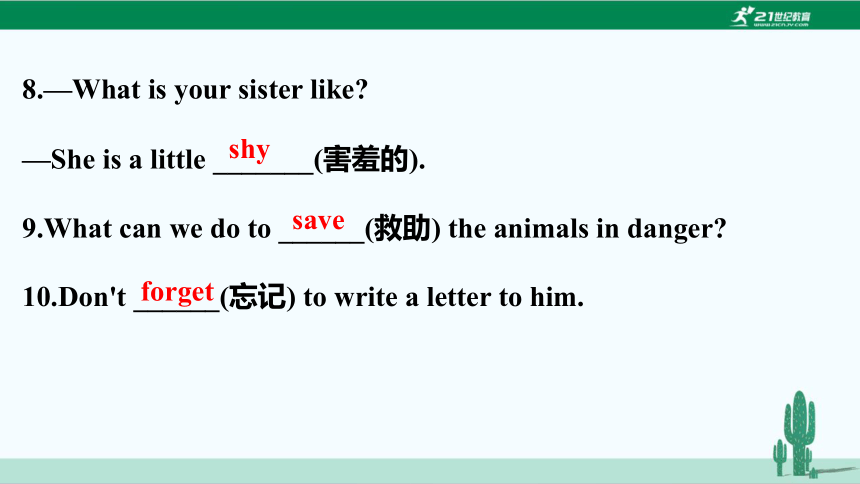
文档简介
(共65张PPT)
Unit 5 单元综合复习
人教版七年级下册
Content
词汇、短语回顾
01
重点句子回顾
02
重点词句精讲
03
语法知识精讲
04
单元话题写作
05
能力提升训练
06
目录
词汇、短语回顾
panda n. 熊猫
zoo n. 动物园
tiger n. 老虎
scary adj. 吓人的; 恐怖的-----scared adj.恐惧的
elephant n. 大象
kind n. 种类
koala n. 树袋熊; 考拉
重点词汇及词汇拓展
Australia n. 澳大利亚 -----Australian adj.澳大利亚的n.澳大利亚人
lion n. 狮子
south adj. 南方的; n. 南; 南方
giraffe n. 长颈鹿----- giraffes(复数)
Africa n. 非洲 -----African adj.&n.非洲的;非洲人的; 非洲人
animal n. 动物
leg n. 腿
lazy adj. 懒散的;懒惰的-----hard-working (反义词) adj. 勤奋的;辛勤的;工作努力的
cat n. 猫
smart adj. 聪明的
sleep v.&n. 睡觉-----sleepy adj. 困倦的-----asleep adj. 睡着的;睡熟的
beautiful adj. 美丽的;美好的 -----beauty n. 美,美丽;美人-----beautifully adv. 漂亮地
down adv. (坐,躺,倒)下;prep. 向下; 沿着-----up (反义词)
shy adj. 羞怯的; 腼腆的
tree n. 树
save v. 救; 救助
kill v. 杀死; 弄死
symbol n. 象征
cut v. 砍; 切-----cutting (现在分词)—cut(过去式)
ivory n. 象牙
flag n. 旗; 旗帜-----flags (复数)
over prep. 超过, 多于; 在…上方-----more than (同义短语)
forget v. 忘记; 遗忘-----remember (反义词) v. 记得;记住
Thailand n. 泰国
place n. 地点; 位置
Thai adj.&n. 泰国人(的); 泰语(的)
danger n. 危险 -----dangerous adj. 危险的;不安全的-----endangered adj. 濒危的
friendly adj. 友好的 -----friend n. 朋友-----unfriendly(反义词) adj. 不友好的-----friendship n.友谊;友情
water n. 水
pet n. 宠物
cute adj. 可爱的;机灵的
一、根据句意及汉语或首字母提示完成单词。
即讲即练
1.1.I'm thirsty. Please give me a bottle of ________(水).
2.—Does the lion come from ________(非洲)
—Yes, it does.
3.We can't______(杀死) the animals;they are our friends.
water
Africa
kill
4.Our national ______ (旗) is red and we love our country.
5.I don't remember this ______(地点).Can you tell me
6.Don't be ______(懒惰的). Get up and have breakfast.
7.We all like the animal because it is very ________(聪明的).
flag
place
lazy
smart
8.—What is your sister like
—She is a little _______(害羞的).
9.What can we do to ______(救助) the animals in danger
10.Don't ______(忘记) to write a letter to him.
shy
save
forget
all day 整天
a lot 非常; 很
black and white 黑白相间
let sb. do sth. 让某人做某事
South Africa 南非
want to do sth. 想做某事
kind of 稍微,有点儿
重点短语
really scary 确实吓人
walk on two legs 用两条腿走路
be from=come from 来自
get lost 迷路
save the elephants 拯救大象
be in (great) danger 处于(极大)危险之中
one of…… ……的其中之一
lose one's home 失去家园
a symbol of…… ……的标志/象征
cut down 砍倒
good luck 祝好运
(be) made of 由…制成的
kill……for…… 为……杀死……
five years old 五岁
come to 来到
play music 演奏音乐
draw well 画得好
即讲即练
1. 我妹妹最喜欢的动物是熊猫。
My sister’s _________ ________ are pandas.
2. 大象是泰国的标志之一。
The elephant is _______ _______ Thailand’s ________.
3. 他们为什么看着我?
_______ are they ______ ______ me
一、根据汉语提示完成句子。
favorite animals
one of symbols
Why looking at
4. 她喜欢和她的中国朋友玩。
She likes to ______ ______ her Chinese friends.
5. 拉里非常懒惰,通常每天睡14个小时。
Larry is very______, and he usually sleeps 14 hours ______ _____.
6. -难道熊不可爱吗? -不,可爱。
-________bears cute - ______, they ______.
7. 咱们先去看考拉吧。
______ go to see the koalas_____.
Aren’t, Yes are
play with
lazy every day
Let’s first
重点句子回顾
1.Let's see the pandas first. They're my favorite animals.
咱们先看熊猫吧。我最喜欢熊猫了。
2.--Why do you like pandas 你为什么喜欢大熊猫?
--Because they're very cute. 因为它们非常可爱。
3.—Where are lions from 狮子来自什么地方?
—They're from South Africa. 它们来自南非。
4.He can walk on two legs. 他能用两条腿走路。
5.— Why don't you like the cat 你为什么不喜欢这只猫?
— Well, because she's kind of boring. She sleeps all day.
嗯,因为她有点儿令人乏味。她整天都在睡觉。
6. Elephants can walk for a long time and never get lost.大象能够长时间行走,而且不迷路。
7.But elephants are in great danger. 但是大象面临巨大的危险。
8.We must save the trees and not buy things made of ivory.
我们必须拯救树木,拒买象牙制品。
9.I like dogs because they're friendly and smart. 我喜欢狗因为它们友好而且聪明。
10.They can also remember places with food and water.它们也能记住有食物和水的地方。
重点词句精讲
1.let's 与 let us
Let's do sth. 说话的人和说话的对象一起做某事,强调包括说话者和对方在内。
Let us do sth.用来请求允许,这里的us不包括你说话的对象。
eg:Let's sing an English song, Li Ming. (提出建议,对方参与)
李明,咱们唱一首英文歌曲吧。
Let us go home, Mr. Li. 李老师,让我们回家吧。(请求允许,不包括李老师在内)
Let's see the pandas first. 我们先看熊猫吧。
2.first的用法
作one的序数词,表示“第一”。
作副词,意为“首先”,用来做状语,可置于句首或句末。
作形容词,意为“最初的,首先的;首要的”,常用来作定语。
eg:Let's see the pandas first. 我们先看熊猫吧。
First, You should do your homework. 你应当先做作业。
January is the first month of a year. 一月是一年中的第一个月。The first thing for us is to learn English well. 对我们来说首要的事就是学好英语。
3.favorite的用法
favorite adj. 最喜爱的,特别喜爱的
可与like……best互换。
What's one’s favorite…… =What……does/do sb. like best
eg:They’re my favorite animals. 它们是我最喜欢的动物。
What is your favorite sport = What sport do you like best
你最喜欢什么运动?
favorite还可用作名词,意为“最喜欢的人或事物”,既可以指人,也可以指物。
eg:Which one is your favorite 你最喜欢哪一个?
【注意】美式英语多用favorite,英式英语多用favourite
4. be from 与 come from
两者意思都是“从……来,来自……”。
be from的人称和数的变化都是在be上体现,become from的句式变化须借助助动词do /does /did来完成,且谓语动词come受主语的影响
eg:Is he from England 他来自英国吗?
Li Ming comes from Shandong. 李明来自山东。
They don't come from China. 他们不是来自中国。
5.walk on……
walk on…… 意为“用某种方式行走”,其中on为“由……支撑着”的含义。
eg:He can walk on two legs. 他会用两条腿走路。
Peter can walk on two hands. 彼得会用两只手倒立行走。
6.Why don't you和Why not
Why don't you…… 用于向对方提出建议,这时相当于“Why not…… ”,其后接动词原形。
Why don't you go to bed now 你为什么不现在上床睡觉呢?
=Why not go to bed now
Why don't you…… 还可用于向对方询问不做某事的原因,其后接动词原形。
eg:Why don't you want to go out 你为什么不想出去?
7.a lot用法
a lot意为“很;非常”,相当于very much,用作副词,常用来修饰形容词、副词或动词。
eg:I like Liu Dehua’s songs a lot. 我很喜欢刘德华的歌。
It rains a lot this week 这周下了很多雨。
【知识拓展】
a lot of= lots of意为“许多”,修饰名词。
8.you're right,All right,that's right与that's all right
All right. 的三种用法
表示赞同对方的意见,意思是“行,好吧”。
用在系动词 be (am, is are)后,表示健康状况,相当于fine或well,意思为“身体好”,“病好了”。
表示“令人满意的”“顺利的”
eg:—Let’s play football. 让我们踢足球吧。
—All right. 行,好吧
—How are you 你好吗?
—I’m all right. 我没事。
He is excellent. His work is all right . 他很优秀。他的工作还好。
That’s all right.的用法
用于对别人表示感谢的答语,意思是“不用谢,不客气”,相当于That’s OK. / Not at all. /You’re welcome.
用于别人向你道歉时的答语,意思是“没关系”,相当于Never mind / It doesn’t matter.
eg:—I’m sorry, I’m late. 对不起,我迟到了。
—That’s all right. 没关系。
—Thank you very much. 谢谢
—That’s all right./You’re welcome. 不用谢,不客气
That’s right.用法
同意对方的观点或看法,表示判断对错,意思是“对”,“正确”
eg:—What’s four and six 四加六是多少?
—It’s ten. 等于10
—That’s right. 对了
you're right
意思是“你说得对”,用于对别人的说法,表示赞同。
eg:—It's wonderful! 太精彩了!
—You're right. 你说得对。
9.friendly的用法
friendly adj. 友好的
常用短语为:be good/nice/kind/friendly to…… 对……友好。be friendly with…… 和某人关系好”或“与某人要好
eg:The old man is very friendly. 那位老人爭常友好。
My friends are all friendly to me. 我的朋友都对我很友好。
The children here are friendly with each other. 这里的孩子相互之间关系很好。
10.small,little与young
small指物体在形状、外形的大小
little带有一定的感彩,有“小而可爱”之意
young指在年龄上小,意为“年轻的”
eg:The koala is very small. 那只树袋熊非常小。
She lives in a small house. 她住在一所小房子里。
My cousin is a little boy. 我的表弟是个小男孩儿。
As a young man, he is very polite to the old people.作为一个年轻人,他对老人有礼貌。
11.forget的用法
forget v. 忘记;遗忘
forget to do sth.表示“忘记要做某事”,事情还没有做。
forget doing sth.表示“忘记曾经做过某事”,事情已经做过了。
eg:I’m sorry I forgot to return the library book.对不起,我忘记归还图书馆的书了。
Mary often forgets to bring her pen. 玛丽经常忘记带她的钢笔。
He forgets turning the light off. 他忘记他已经关灯了。
12.get lost
lost adj. 丢失的 动词形式为lose,意为“丢失”
get lost 迷路;丢失,相当于be lost。
eg:It's easy to get lost in the forest. 在森林里很容易迷路。
= It's easy to be lost in the forest.
Lucy's book is lost.=Lucy's book gets lost. 露西的书丢了。
13.water的用法
water n. 水;vt. 浇水
eg:There is no water in the cup. 杯子里没有水。
My mother waters the flowers every day. 我妈妈每天都给这些花儿浇水。
14.danger的用法
danger作不可数名词,意为“危险”。
常用短语:be in (great) danger处于(极大)危险中,be out of danger脱离危险
eg:But elephants are in great danger. 但是大象处境非常危险
They saved him from danger. 他们使他脱离了危险。
The wounded soldier is out of danger now. 那个受伤的士兵现在脱离危险了。
15.cut down
cut v. 砍;切
常用短语:cut down 砍伐;砍倒
eg:People cut down many trees so elephants are losing their homes.人们大量砍伐树木,因此 大象正在逐渐失去它们的家园。
Mom is cutting the birthday cake for us. 妈妈正在为我们切生日蛋糕。
与cut相关的短语:cut off切断;切除 cut up 切碎
cut out删除 cut in插嘴
16.数词+years old 与 数词-year-old
“数词+years old”常用来表示年龄,意为“……岁”。
“数词-year-old”构成复合形容词,词与词之间用连字符连接,其中的year必须用单数,在句中常作定语。
eg:She is twelve years old. 她12岁了。
Lily is a 12-year-old girl. 丽丽是一个12岁的女孩儿。
Lily is a 12-years-old girl. 丽丽是一个12岁的女孩儿。(×)
17.否定的一般疑问句
否定的一般疑问句,常用来表示反问、责备,或表示说话人的看法或惊异的情绪,意为“难道……不……吗 ”,其结构是“系动词be/助动词/情态动词的否定形式+主语+其他 ”
eg:Isn't she beautiful 她难道不美丽吗?
Aren't you Chinese 难道你不是中国人吗?
Can't you play basketball 你难道不会打篮球吗?
回答否定的一般疑问句时,如果是肯定回答,用yes头;如果是否定回答,用no开头。但是翻译成汉语时yes意为“不”,no意为“是”。
eg:—Doesn't he have a sister 难道他没有妹妹吗?
—Yes, he does.不,他有。/ No,he doesn't. 是的,他没有。
—Isn't the lion from Africa 难道那只狮子不是来自非洲吗?
—Yes,it is.不,它是。/No,it isn't. 是的,它不是。
语法知识精讲
why是疑问副词,意为“为什么”
用来询问原因、理由。
结构构成:Why +—般疑问句?
一般用Because……来回答。
because是连词,其后要接一个句子来描述原因、理由。because of 接的是名词、名词短语、代词等
why引导的特殊疑问句
eg:Why is she here 她为什么在这儿?
Why does he like this song 他为什么喜欢这首歌?
eg:—Why do you like Chinese 你为什么喜欢语文?
—Because it's very interesting. 因为它很有趣。
He lost his job because of his age. 由于年龄关系他失去了工作。
I didn't buy the shirt because it was too expensive.我没有买这件衬衫,因为它太贵了。
where引导的特殊疑问句
where是疑问副词,意为“在哪里”,用来对地点进行询问
结构构成:Where + 一般疑问句?
—Where are they from 它们来自哪里?
—They are from Shandong. 她们来自山东。
—Where are these watches from 这些手表产自哪里?
—They are from Switzerland. 它们产自瑞士。
单元话题写作
单元话题写作
单元写作目标
此单元的话题是“描述动物并表达喜好”,要求描写动物的外貌、性格,表达自己喜欢或不喜欢它的理由并且说明原因。重点考查学生以下能力:
1.掌握描述动物的基本句型;
2.恰当使用连词because来描述原因;
3.能合理发表个人的喜好或者观点。
素材积累
相关词汇:
1.有点儿 kind of
2.迷路 get lost
3.一种……的象征 a symbol of
相关句型:
开头句
1.My favorite animals are …
2.I like pandas because they are very cute.
中间句
1.They come from South Africa.
2.They are quiet and kind of shy.
3.However, elephants are in great danger now and there are fewer and fewer elephants in the world.
结尾句
1.I hope everyone can do something to save elephants.
2.We should be friendly to animals because they are our good friends.
范例
请以“保护濒危动物”为主题写一篇80词左右的短文,内容包括:1.外貌特征;2.生活习性;3.它们的现状;4.如何保护它们。
审题:
1.文体:记叙文
2.时态:一般现在时
3.人称:第一人称、第三人称
My favorite animals are pandas. They are a symbol of happiness and friendship.
Pandas look fat and cute. They are also quiet and kind of shy. They can climb the trees and swim in the water. What’s more, they eat bamboo leaves.
However, they are in great danger now. So everyone should take action to help them. Scientists are trying to have a better understanding of their habits. We should also learn more about them and protect the forest for them.
能力提升训练
一、用括号内所给单词的适当形式填空。
1.—Why is Alan so popular in your class
—Because he is very _________(friend) to everyone.
2.It's ___________(danger) to play with fire.
3.She doesn't have a map or a mobile phone, so she may get ______ (lose).
friendly
lost
dangerous
4.When we go abroad, we can see many things _______(make) in China.
5.Don't forget __________(close) the windows when you go out.
made
to close
二、根据括号内的要求完成下列各题,每空一词。
1.She likes koalas very much.(改为一般疑问句)
_______ she ______koalas very much
2.Lions are from Africa.(对画线部分提问)
_______ ______lions _______
3.We like dogs because they are very cute.(对画线部分提问)
______ _____you like dogs
Does like
Where are from
Why do
4.Pandas are from China.(改为同义句)
Pandas _______ ______ China.
5.I like cats. They are interesting.(将两句合并为一句)
____________________________________
6.They didn't arrive on time because they got up late. (对画线部分提问)
______ _______ they arrive on time
come from
Why didn't
I like cats because they are interesting.
三、书面表达
赵敏有两只可爱的猫咪,请你根据表格提示,写一篇60词左右的英语短文介绍它们。
Mimi(mother) Baobao(son)
颜色 白色 黄色
年龄 三岁 五个月
性格(character) 安静、懒惰 聪明、友好
One possible version:
Zhao Min has two cats—Mimi and Baobao. Mimi is three years old. She is white. She is quiet and lazy. She likes sleeping very much. Baobao is Mimi’s son. He is only five months old. He is yellow. He is smart and friendly. He likes playing with people. They are very cute. Zhao Min likes them very much.
谢谢
21世纪教育网(www.21cnjy.com)
中小学教育资源网站
兼职招聘:
https://www.21cnjy.com/recruitment/home/admin
Unit 5 单元综合复习
人教版七年级下册
Content
词汇、短语回顾
01
重点句子回顾
02
重点词句精讲
03
语法知识精讲
04
单元话题写作
05
能力提升训练
06
目录
词汇、短语回顾
panda n. 熊猫
zoo n. 动物园
tiger n. 老虎
scary adj. 吓人的; 恐怖的-----scared adj.恐惧的
elephant n. 大象
kind n. 种类
koala n. 树袋熊; 考拉
重点词汇及词汇拓展
Australia n. 澳大利亚 -----Australian adj.澳大利亚的n.澳大利亚人
lion n. 狮子
south adj. 南方的; n. 南; 南方
giraffe n. 长颈鹿----- giraffes(复数)
Africa n. 非洲 -----African adj.&n.非洲的;非洲人的; 非洲人
animal n. 动物
leg n. 腿
lazy adj. 懒散的;懒惰的-----hard-working (反义词) adj. 勤奋的;辛勤的;工作努力的
cat n. 猫
smart adj. 聪明的
sleep v.&n. 睡觉-----sleepy adj. 困倦的-----asleep adj. 睡着的;睡熟的
beautiful adj. 美丽的;美好的 -----beauty n. 美,美丽;美人-----beautifully adv. 漂亮地
down adv. (坐,躺,倒)下;prep. 向下; 沿着-----up (反义词)
shy adj. 羞怯的; 腼腆的
tree n. 树
save v. 救; 救助
kill v. 杀死; 弄死
symbol n. 象征
cut v. 砍; 切-----cutting (现在分词)—cut(过去式)
ivory n. 象牙
flag n. 旗; 旗帜-----flags (复数)
over prep. 超过, 多于; 在…上方-----more than (同义短语)
forget v. 忘记; 遗忘-----remember (反义词) v. 记得;记住
Thailand n. 泰国
place n. 地点; 位置
Thai adj.&n. 泰国人(的); 泰语(的)
danger n. 危险 -----dangerous adj. 危险的;不安全的-----endangered adj. 濒危的
friendly adj. 友好的 -----friend n. 朋友-----unfriendly(反义词) adj. 不友好的-----friendship n.友谊;友情
water n. 水
pet n. 宠物
cute adj. 可爱的;机灵的
一、根据句意及汉语或首字母提示完成单词。
即讲即练
1.1.I'm thirsty. Please give me a bottle of ________(水).
2.—Does the lion come from ________(非洲)
—Yes, it does.
3.We can't______(杀死) the animals;they are our friends.
water
Africa
kill
4.Our national ______ (旗) is red and we love our country.
5.I don't remember this ______(地点).Can you tell me
6.Don't be ______(懒惰的). Get up and have breakfast.
7.We all like the animal because it is very ________(聪明的).
flag
place
lazy
smart
8.—What is your sister like
—She is a little _______(害羞的).
9.What can we do to ______(救助) the animals in danger
10.Don't ______(忘记) to write a letter to him.
shy
save
forget
all day 整天
a lot 非常; 很
black and white 黑白相间
let sb. do sth. 让某人做某事
South Africa 南非
want to do sth. 想做某事
kind of 稍微,有点儿
重点短语
really scary 确实吓人
walk on two legs 用两条腿走路
be from=come from 来自
get lost 迷路
save the elephants 拯救大象
be in (great) danger 处于(极大)危险之中
one of…… ……的其中之一
lose one's home 失去家园
a symbol of…… ……的标志/象征
cut down 砍倒
good luck 祝好运
(be) made of 由…制成的
kill……for…… 为……杀死……
five years old 五岁
come to 来到
play music 演奏音乐
draw well 画得好
即讲即练
1. 我妹妹最喜欢的动物是熊猫。
My sister’s _________ ________ are pandas.
2. 大象是泰国的标志之一。
The elephant is _______ _______ Thailand’s ________.
3. 他们为什么看着我?
_______ are they ______ ______ me
一、根据汉语提示完成句子。
favorite animals
one of symbols
Why looking at
4. 她喜欢和她的中国朋友玩。
She likes to ______ ______ her Chinese friends.
5. 拉里非常懒惰,通常每天睡14个小时。
Larry is very______, and he usually sleeps 14 hours ______ _____.
6. -难道熊不可爱吗? -不,可爱。
-________bears cute - ______, they ______.
7. 咱们先去看考拉吧。
______ go to see the koalas_____.
Aren’t, Yes are
play with
lazy every day
Let’s first
重点句子回顾
1.Let's see the pandas first. They're my favorite animals.
咱们先看熊猫吧。我最喜欢熊猫了。
2.--Why do you like pandas 你为什么喜欢大熊猫?
--Because they're very cute. 因为它们非常可爱。
3.—Where are lions from 狮子来自什么地方?
—They're from South Africa. 它们来自南非。
4.He can walk on two legs. 他能用两条腿走路。
5.— Why don't you like the cat 你为什么不喜欢这只猫?
— Well, because she's kind of boring. She sleeps all day.
嗯,因为她有点儿令人乏味。她整天都在睡觉。
6. Elephants can walk for a long time and never get lost.大象能够长时间行走,而且不迷路。
7.But elephants are in great danger. 但是大象面临巨大的危险。
8.We must save the trees and not buy things made of ivory.
我们必须拯救树木,拒买象牙制品。
9.I like dogs because they're friendly and smart. 我喜欢狗因为它们友好而且聪明。
10.They can also remember places with food and water.它们也能记住有食物和水的地方。
重点词句精讲
1.let's 与 let us
Let's do sth. 说话的人和说话的对象一起做某事,强调包括说话者和对方在内。
Let us do sth.用来请求允许,这里的us不包括你说话的对象。
eg:Let's sing an English song, Li Ming. (提出建议,对方参与)
李明,咱们唱一首英文歌曲吧。
Let us go home, Mr. Li. 李老师,让我们回家吧。(请求允许,不包括李老师在内)
Let's see the pandas first. 我们先看熊猫吧。
2.first的用法
作one的序数词,表示“第一”。
作副词,意为“首先”,用来做状语,可置于句首或句末。
作形容词,意为“最初的,首先的;首要的”,常用来作定语。
eg:Let's see the pandas first. 我们先看熊猫吧。
First, You should do your homework. 你应当先做作业。
January is the first month of a year. 一月是一年中的第一个月。The first thing for us is to learn English well. 对我们来说首要的事就是学好英语。
3.favorite的用法
favorite adj. 最喜爱的,特别喜爱的
可与like……best互换。
What's one’s favorite…… =What……does/do sb. like best
eg:They’re my favorite animals. 它们是我最喜欢的动物。
What is your favorite sport = What sport do you like best
你最喜欢什么运动?
favorite还可用作名词,意为“最喜欢的人或事物”,既可以指人,也可以指物。
eg:Which one is your favorite 你最喜欢哪一个?
【注意】美式英语多用favorite,英式英语多用favourite
4. be from 与 come from
两者意思都是“从……来,来自……”。
be from的人称和数的变化都是在be上体现,become from的句式变化须借助助动词do /does /did来完成,且谓语动词come受主语的影响
eg:Is he from England 他来自英国吗?
Li Ming comes from Shandong. 李明来自山东。
They don't come from China. 他们不是来自中国。
5.walk on……
walk on…… 意为“用某种方式行走”,其中on为“由……支撑着”的含义。
eg:He can walk on two legs. 他会用两条腿走路。
Peter can walk on two hands. 彼得会用两只手倒立行走。
6.Why don't you和Why not
Why don't you…… 用于向对方提出建议,这时相当于“Why not…… ”,其后接动词原形。
Why don't you go to bed now 你为什么不现在上床睡觉呢?
=Why not go to bed now
Why don't you…… 还可用于向对方询问不做某事的原因,其后接动词原形。
eg:Why don't you want to go out 你为什么不想出去?
7.a lot用法
a lot意为“很;非常”,相当于very much,用作副词,常用来修饰形容词、副词或动词。
eg:I like Liu Dehua’s songs a lot. 我很喜欢刘德华的歌。
It rains a lot this week 这周下了很多雨。
【知识拓展】
a lot of= lots of意为“许多”,修饰名词。
8.you're right,All right,that's right与that's all right
All right. 的三种用法
表示赞同对方的意见,意思是“行,好吧”。
用在系动词 be (am, is are)后,表示健康状况,相当于fine或well,意思为“身体好”,“病好了”。
表示“令人满意的”“顺利的”
eg:—Let’s play football. 让我们踢足球吧。
—All right. 行,好吧
—How are you 你好吗?
—I’m all right. 我没事。
He is excellent. His work is all right . 他很优秀。他的工作还好。
That’s all right.的用法
用于对别人表示感谢的答语,意思是“不用谢,不客气”,相当于That’s OK. / Not at all. /You’re welcome.
用于别人向你道歉时的答语,意思是“没关系”,相当于Never mind / It doesn’t matter.
eg:—I’m sorry, I’m late. 对不起,我迟到了。
—That’s all right. 没关系。
—Thank you very much. 谢谢
—That’s all right./You’re welcome. 不用谢,不客气
That’s right.用法
同意对方的观点或看法,表示判断对错,意思是“对”,“正确”
eg:—What’s four and six 四加六是多少?
—It’s ten. 等于10
—That’s right. 对了
you're right
意思是“你说得对”,用于对别人的说法,表示赞同。
eg:—It's wonderful! 太精彩了!
—You're right. 你说得对。
9.friendly的用法
friendly adj. 友好的
常用短语为:be good/nice/kind/friendly to…… 对……友好。be friendly with…… 和某人关系好”或“与某人要好
eg:The old man is very friendly. 那位老人爭常友好。
My friends are all friendly to me. 我的朋友都对我很友好。
The children here are friendly with each other. 这里的孩子相互之间关系很好。
10.small,little与young
small指物体在形状、外形的大小
little带有一定的感彩,有“小而可爱”之意
young指在年龄上小,意为“年轻的”
eg:The koala is very small. 那只树袋熊非常小。
She lives in a small house. 她住在一所小房子里。
My cousin is a little boy. 我的表弟是个小男孩儿。
As a young man, he is very polite to the old people.作为一个年轻人,他对老人有礼貌。
11.forget的用法
forget v. 忘记;遗忘
forget to do sth.表示“忘记要做某事”,事情还没有做。
forget doing sth.表示“忘记曾经做过某事”,事情已经做过了。
eg:I’m sorry I forgot to return the library book.对不起,我忘记归还图书馆的书了。
Mary often forgets to bring her pen. 玛丽经常忘记带她的钢笔。
He forgets turning the light off. 他忘记他已经关灯了。
12.get lost
lost adj. 丢失的 动词形式为lose,意为“丢失”
get lost 迷路;丢失,相当于be lost。
eg:It's easy to get lost in the forest. 在森林里很容易迷路。
= It's easy to be lost in the forest.
Lucy's book is lost.=Lucy's book gets lost. 露西的书丢了。
13.water的用法
water n. 水;vt. 浇水
eg:There is no water in the cup. 杯子里没有水。
My mother waters the flowers every day. 我妈妈每天都给这些花儿浇水。
14.danger的用法
danger作不可数名词,意为“危险”。
常用短语:be in (great) danger处于(极大)危险中,be out of danger脱离危险
eg:But elephants are in great danger. 但是大象处境非常危险
They saved him from danger. 他们使他脱离了危险。
The wounded soldier is out of danger now. 那个受伤的士兵现在脱离危险了。
15.cut down
cut v. 砍;切
常用短语:cut down 砍伐;砍倒
eg:People cut down many trees so elephants are losing their homes.人们大量砍伐树木,因此 大象正在逐渐失去它们的家园。
Mom is cutting the birthday cake for us. 妈妈正在为我们切生日蛋糕。
与cut相关的短语:cut off切断;切除 cut up 切碎
cut out删除 cut in插嘴
16.数词+years old 与 数词-year-old
“数词+years old”常用来表示年龄,意为“……岁”。
“数词-year-old”构成复合形容词,词与词之间用连字符连接,其中的year必须用单数,在句中常作定语。
eg:She is twelve years old. 她12岁了。
Lily is a 12-year-old girl. 丽丽是一个12岁的女孩儿。
Lily is a 12-years-old girl. 丽丽是一个12岁的女孩儿。(×)
17.否定的一般疑问句
否定的一般疑问句,常用来表示反问、责备,或表示说话人的看法或惊异的情绪,意为“难道……不……吗 ”,其结构是“系动词be/助动词/情态动词的否定形式+主语+其他 ”
eg:Isn't she beautiful 她难道不美丽吗?
Aren't you Chinese 难道你不是中国人吗?
Can't you play basketball 你难道不会打篮球吗?
回答否定的一般疑问句时,如果是肯定回答,用yes头;如果是否定回答,用no开头。但是翻译成汉语时yes意为“不”,no意为“是”。
eg:—Doesn't he have a sister 难道他没有妹妹吗?
—Yes, he does.不,他有。/ No,he doesn't. 是的,他没有。
—Isn't the lion from Africa 难道那只狮子不是来自非洲吗?
—Yes,it is.不,它是。/No,it isn't. 是的,它不是。
语法知识精讲
why是疑问副词,意为“为什么”
用来询问原因、理由。
结构构成:Why +—般疑问句?
一般用Because……来回答。
because是连词,其后要接一个句子来描述原因、理由。because of 接的是名词、名词短语、代词等
why引导的特殊疑问句
eg:Why is she here 她为什么在这儿?
Why does he like this song 他为什么喜欢这首歌?
eg:—Why do you like Chinese 你为什么喜欢语文?
—Because it's very interesting. 因为它很有趣。
He lost his job because of his age. 由于年龄关系他失去了工作。
I didn't buy the shirt because it was too expensive.我没有买这件衬衫,因为它太贵了。
where引导的特殊疑问句
where是疑问副词,意为“在哪里”,用来对地点进行询问
结构构成:Where + 一般疑问句?
—Where are they from 它们来自哪里?
—They are from Shandong. 她们来自山东。
—Where are these watches from 这些手表产自哪里?
—They are from Switzerland. 它们产自瑞士。
单元话题写作
单元话题写作
单元写作目标
此单元的话题是“描述动物并表达喜好”,要求描写动物的外貌、性格,表达自己喜欢或不喜欢它的理由并且说明原因。重点考查学生以下能力:
1.掌握描述动物的基本句型;
2.恰当使用连词because来描述原因;
3.能合理发表个人的喜好或者观点。
素材积累
相关词汇:
1.有点儿 kind of
2.迷路 get lost
3.一种……的象征 a symbol of
相关句型:
开头句
1.My favorite animals are …
2.I like pandas because they are very cute.
中间句
1.They come from South Africa.
2.They are quiet and kind of shy.
3.However, elephants are in great danger now and there are fewer and fewer elephants in the world.
结尾句
1.I hope everyone can do something to save elephants.
2.We should be friendly to animals because they are our good friends.
范例
请以“保护濒危动物”为主题写一篇80词左右的短文,内容包括:1.外貌特征;2.生活习性;3.它们的现状;4.如何保护它们。
审题:
1.文体:记叙文
2.时态:一般现在时
3.人称:第一人称、第三人称
My favorite animals are pandas. They are a symbol of happiness and friendship.
Pandas look fat and cute. They are also quiet and kind of shy. They can climb the trees and swim in the water. What’s more, they eat bamboo leaves.
However, they are in great danger now. So everyone should take action to help them. Scientists are trying to have a better understanding of their habits. We should also learn more about them and protect the forest for them.
能力提升训练
一、用括号内所给单词的适当形式填空。
1.—Why is Alan so popular in your class
—Because he is very _________(friend) to everyone.
2.It's ___________(danger) to play with fire.
3.She doesn't have a map or a mobile phone, so she may get ______ (lose).
friendly
lost
dangerous
4.When we go abroad, we can see many things _______(make) in China.
5.Don't forget __________(close) the windows when you go out.
made
to close
二、根据括号内的要求完成下列各题,每空一词。
1.She likes koalas very much.(改为一般疑问句)
_______ she ______koalas very much
2.Lions are from Africa.(对画线部分提问)
_______ ______lions _______
3.We like dogs because they are very cute.(对画线部分提问)
______ _____you like dogs
Does like
Where are from
Why do
4.Pandas are from China.(改为同义句)
Pandas _______ ______ China.
5.I like cats. They are interesting.(将两句合并为一句)
____________________________________
6.They didn't arrive on time because they got up late. (对画线部分提问)
______ _______ they arrive on time
come from
Why didn't
I like cats because they are interesting.
三、书面表达
赵敏有两只可爱的猫咪,请你根据表格提示,写一篇60词左右的英语短文介绍它们。
Mimi(mother) Baobao(son)
颜色 白色 黄色
年龄 三岁 五个月
性格(character) 安静、懒惰 聪明、友好
One possible version:
Zhao Min has two cats—Mimi and Baobao. Mimi is three years old. She is white. She is quiet and lazy. She likes sleeping very much. Baobao is Mimi’s son. He is only five months old. He is yellow. He is smart and friendly. He likes playing with people. They are very cute. Zhao Min likes them very much.
谢谢
21世纪教育网(www.21cnjy.com)
中小学教育资源网站
兼职招聘:
https://www.21cnjy.com/recruitment/home/admin
同课章节目录
- Unit 1 Can you play the guitar?
- Section A
- Section B
- Unit 2 What time do you go to school?
- Section A
- Section B
- Unit 3 How do you get to school?
- Section A
- Section B
- Unit 4 Don't eat in class.
- Section A
- Section B
- Unit 5 Why do you like pandas?
- Section A
- Section B
- Unit 6 I'm watching TV.
- Section A
- Section B
- Review of Units 1-6
- Unit 7 It's raining!
- Section A
- Section B
- Unit 8 Is there a post office near here?
- Section A
- Section B
- Unit 9 What does he look like?
- Section A
- Section B
- Unit 10 I'd like some noodles.
- Section A
- Section B
- Unit 11 How was your school trip?
- Section A
- Section B
- Unit 12 What did you do last weekend?
- Section A
- Section B
